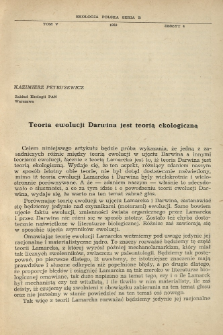- Search in all Repository
- Literature and maps
- Archeology
- Mills database
- Natural sciences
Advanced search
Advanced search
Advanced search
Advanced search
Advanced search

Object
Title: Teoria ewolucji Darwina jest teorią ekologiczną
Subtitle:
Teoria ewolucji Darwina ; Darwin’s evolution theory is an ecological one
Contributor:
Polska Akademia Nauk. Komitet Ekologiczny
Publisher:
Place of publishing:
Description:
Strony 297-302 ; 24 cm ; Streszczenie w języku angielskim
Type of object:
Abstract:
Darwin’s evolution theory is compared by the author with this part of Lamarck’s theory from which it took its origin later on the mechanolamarckism. The author tries to prove that irrespectively of the fact whether the acquired properties are inheritable or not, the Lamarckian theory can throw no light at all on the reasons of evolution process. Namely theory of Lamarck is based exlucively on individual processes: modifications under influence of environment and heredity of acquired characters. Evolution process is an ecological one. Populations are subject to evolution and are liable to the laws and regularities arising from mass processes in dependency on the environment and on other organisms. These are laws and regularities resulting form the probability of occurring such and no other events i.e. the laws of eco1ogy of the group. The ecological laws are the laws of mass accidents and not of the individual cases of particular creatures. It is only the Darwinian evolution theory which basing on the natural selectlon i.e.on interaction of individual genotypic variation and heredity processes with process of struggle for existence is an ecological theory and is able to explain satisfactorily the causes of the evolution process. Geneticists at beginnings of XX century dealing with regularities of inheritance by individuails worked on another level than evolutionists. Common ideas were established only by the population genetics studying the mass processes occurring in population and not only the individual cases. So as no one would try to explain by means of physiological or psychological laws the progress of mankind, so there are useless all endeavours to solve the problem of evolution of organic world basing either on physiologilcal processes only or on regularities of individual genectics.
Relation:
Volume:
Issue:
Start page:
End page:
Detailed Resource Type:
Resource Identifier:
oai:rcin.org.pl:114783 ; ISSN 0424-7205
Source:
MiIZ PAN, sygn. P.3259 ; click here to follow the link
Language:
Language of abstract:
Rights:
Licencja Creative Commons Uznanie autorstwa 3.0 Polska
Terms of use:
Zasób chroniony prawem autorskim. [CC BY 3.0 PL] Korzystanie dozwolone zgodnie z licencją Creative Commons Uznanie autorstwa 3.0 Polska, której pełne postanowienia dostępne są pod adresem: ; -
Digitizing institution:
Muzeum i Instytut Zoologii Polskiej Akademii Nauk
Original in:
Biblioteka Muzeum i Instytutu Zoologii PAN
Projects co-financed by:
Access:
Object collections:
- Digital Repository of Scientific Institutes > Partners' collections > Museum and Institute of Zoology PAS > Scientific Journals
- Digital Repository of Scientific Institutes > Literature > Journals/Articles
Last modified:
Feb 4, 2022
In our library since:
Feb 24, 2020
Number of object content downloads / hits:
253
All available object's versions:
https://rcin.org.pl./publication/97637
Show description in RDF format:
Show description in RDFa format:
Show description in OAI-PMH format:
| Edition name | Date |
|---|---|
| Z. 4. Teoria ewolucji Darwina jest teorią ekologiczną / Petrusewicz K. | Feb 4, 2022 |
Objects Similar
Uchmański, Janusz
Dobrowolski, Kazimierz A.
Petrusewicz, Kazimierz
Uchmański, Janusz
Grodzińska, Krystyna

 INSTYTUT ARCHEOLOGII I ETNOLOGII POLSKIEJ AKADEMII NAUK
INSTYTUT ARCHEOLOGII I ETNOLOGII POLSKIEJ AKADEMII NAUK
 INSTYTUT BADAŃ LITERACKICH POLSKIEJ AKADEMII NAUK
INSTYTUT BADAŃ LITERACKICH POLSKIEJ AKADEMII NAUK
 INSTYTUT BADAWCZY LEŚNICTWA
INSTYTUT BADAWCZY LEŚNICTWA
 INSTYTUT BIOLOGII DOŚWIADCZALNEJ IM. MARCELEGO NENCKIEGO POLSKIEJ AKADEMII NAUK
INSTYTUT BIOLOGII DOŚWIADCZALNEJ IM. MARCELEGO NENCKIEGO POLSKIEJ AKADEMII NAUK
 INSTYTUT BIOLOGII SSAKÓW POLSKIEJ AKADEMII NAUK
INSTYTUT BIOLOGII SSAKÓW POLSKIEJ AKADEMII NAUK
 INSTYTUT CHEMII FIZYCZNEJ PAN
INSTYTUT CHEMII FIZYCZNEJ PAN
 INSTYTUT CHEMII ORGANICZNEJ PAN
INSTYTUT CHEMII ORGANICZNEJ PAN
 INSTYTUT FILOZOFII I SOCJOLOGII PAN
INSTYTUT FILOZOFII I SOCJOLOGII PAN
 INSTYTUT GEOGRAFII I PRZESTRZENNEGO ZAGOSPODAROWANIA PAN
INSTYTUT GEOGRAFII I PRZESTRZENNEGO ZAGOSPODAROWANIA PAN
 INSTYTUT HISTORII im. TADEUSZA MANTEUFFLA POLSKIEJ AKADEMII NAUK
INSTYTUT HISTORII im. TADEUSZA MANTEUFFLA POLSKIEJ AKADEMII NAUK
 INSTYTUT JĘZYKA POLSKIEGO POLSKIEJ AKADEMII NAUK
INSTYTUT JĘZYKA POLSKIEGO POLSKIEJ AKADEMII NAUK
 INSTYTUT MATEMATYCZNY PAN
INSTYTUT MATEMATYCZNY PAN
 INSTYTUT MEDYCYNY DOŚWIADCZALNEJ I KLINICZNEJ IM.MIROSŁAWA MOSSAKOWSKIEGO POLSKIEJ AKADEMII NAUK
INSTYTUT MEDYCYNY DOŚWIADCZALNEJ I KLINICZNEJ IM.MIROSŁAWA MOSSAKOWSKIEGO POLSKIEJ AKADEMII NAUK
 INSTYTUT PODSTAWOWYCH PROBLEMÓW TECHNIKI PAN
INSTYTUT PODSTAWOWYCH PROBLEMÓW TECHNIKI PAN
 INSTYTUT SLAWISTYKI PAN
INSTYTUT SLAWISTYKI PAN
 SIEĆ BADAWCZA ŁUKASIEWICZ - INSTYTUT TECHNOLOGII MATERIAŁÓW ELEKTRONICZNYCH
SIEĆ BADAWCZA ŁUKASIEWICZ - INSTYTUT TECHNOLOGII MATERIAŁÓW ELEKTRONICZNYCH
 MUZEUM I INSTYTUT ZOOLOGII POLSKIEJ AKADEMII NAUK
MUZEUM I INSTYTUT ZOOLOGII POLSKIEJ AKADEMII NAUK
 INSTYTUT BADAŃ SYSTEMOWYCH PAN
INSTYTUT BADAŃ SYSTEMOWYCH PAN
 INSTYTUT BOTANIKI IM. WŁADYSŁAWA SZAFERA POLSKIEJ AKADEMII NAUK
INSTYTUT BOTANIKI IM. WŁADYSŁAWA SZAFERA POLSKIEJ AKADEMII NAUK


































